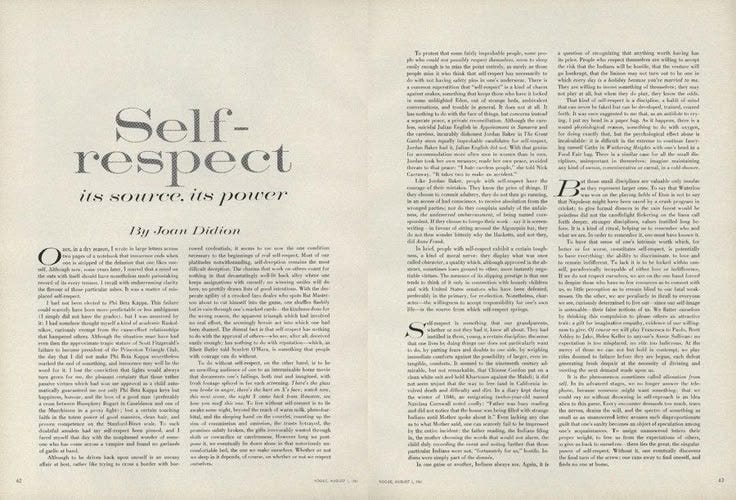There was a moment, sometime around the entrance into the Year of the Wood Snake—a year that, as a Snake, felt strangely significant—when I found myself caught in the undertow of my own thoughts. I had stepped into the quiet abyss of an existential crisis, one that would shadow me for weeks, pressing against every decision, every interaction, every imagined future. Existence itself felt heavy, as if I were tasked with holding it up with both hands. And in the midst of this, I found myself turning once again to Joan Didion’s essay On Self-Respect.
I had read the essay before, but this time, something touched me differently. Didion treats self-respect as an act of reckoning, a private contract with oneself. It is not about approval, nor about winning or losing, but about standing firmly within one's own narrative without the desperate need to be understood. She writes of those who live their mistakes rather than survive them, and I began to wonder whether my crisis wasn’t just another story I had created—a poorly constructed narrative in which I had cast myself as both the protagonist and the tragic victim.
The realization was not dramatic. It arrived in small, ordinary moments: working remotely in a coffee shop, I watched a businessman in a crisp three-piece suit pause mid-commute to order a coffee and a slice of cake, taking twenty minutes in the winter sun before returning to his day; sitting on the train, I observed an elderly woman, impeccably dressed, carefully applying lipstick in a compact mirror before meeting what appeared to be her granddaughter; walking through a quiet alley in Yoyogi Park, I noticed a young woman stop her bicycle to admire the plum blossoms, lingering for just a moment before pedaling away. None of these moments were monumental, none were grand; they were just small acts of presence, of choosing to exist fully in a single moment. Just movement, just life happening. Maybe I had been assigning weight where there was none, mistaking my own perception for reality.
It occurred to me then that life is, in many ways, a reflection of the mind that perceives it. The outer world, in all its unpredictability, mirrors the inner one. What I seek, I see; what I see, I become. The world is not fixed, not rigid; it bends and shifts according to attention as it offers both chaos and beauty, but I choose which to cultivate. And if that is true, then life is not that serious. It is fluid, playful, a set to be rearranged rather than a structure to be upheld.
Perhaps self-respect, then, is the ability to let the world be what it is without the compulsion to wrestle it into submission. To receive it and become open to it rather than impose meaning onto it. It is perhaps also the willingness to take action toward the things that stir something within me—the moments of curiosity, of excitement, of recognition. To move toward what feels true, rather than wait for permission to embrace it. To choose vibrancy over lethargy. I started to test this in small ways, and life is becoming more malleable.
This is not about detachment or indifference. It is about caring differently.
A care that allows for pause. For silence. For the possibility that not everything is a test, that some things are just fleeting, absurd, momentary. Not everything demands significance. There is a quiet freedom in that. The freedom of letting life hand you things without assuming they are assignments, without rushing to respond.
Didion wrote that “character—the willingness to accept responsibility for one’s own life—is the source from which self-respect springs.” Perhaps that was what I had been missing. Not the burden of responsibility, but the ease of it. The understanding that everything (the triumphs, the failures, the mundane in-between) is just life, neither cruel nor kind, simply life being life.
And so, after all, it is not that serious.




Loved this: “The understanding that everything (the triumphs, the failures, the mundane in-between) is just life, neither cruel nor kind, simply life being life.” Reminds me of Epictetus, especially the early passages, when he talks about life being no more than life. I’ll have to read the Didion essay!
“Not the burden of the responsibility, but the ease of it.”
Brilliant! Thank you for these insights x